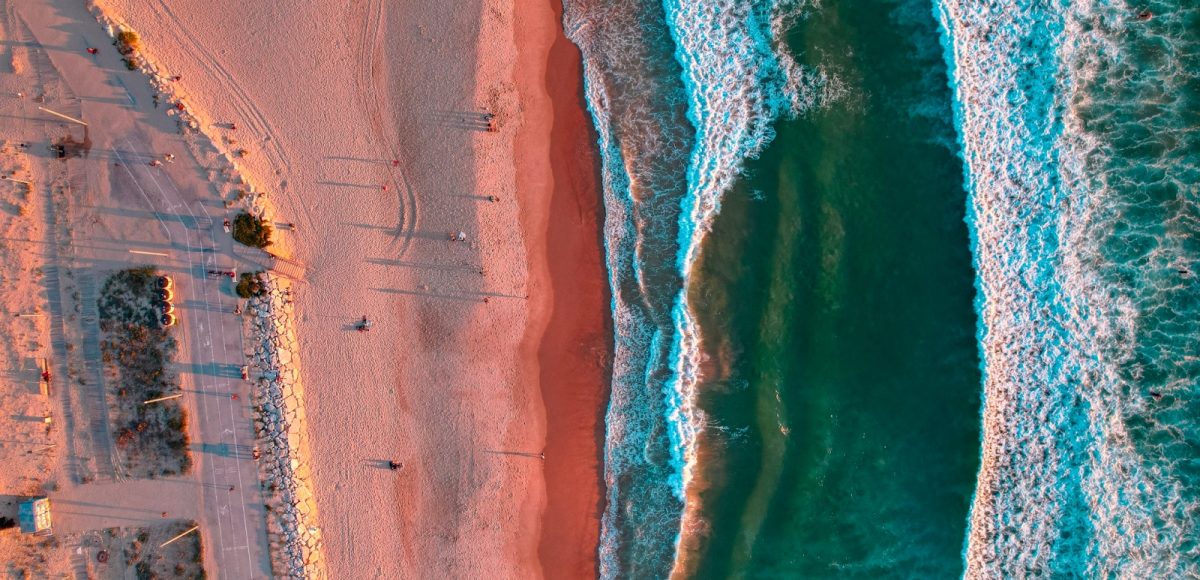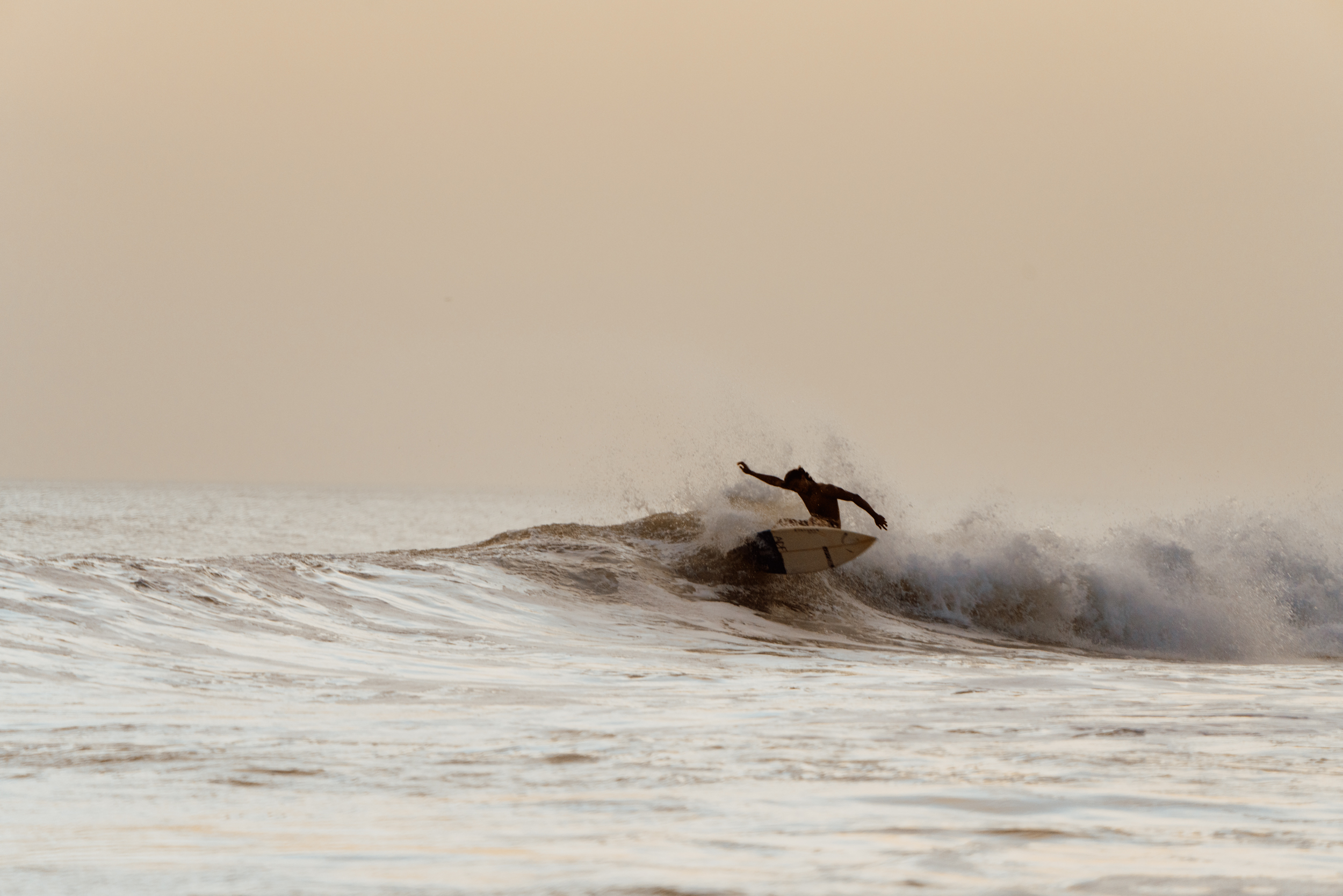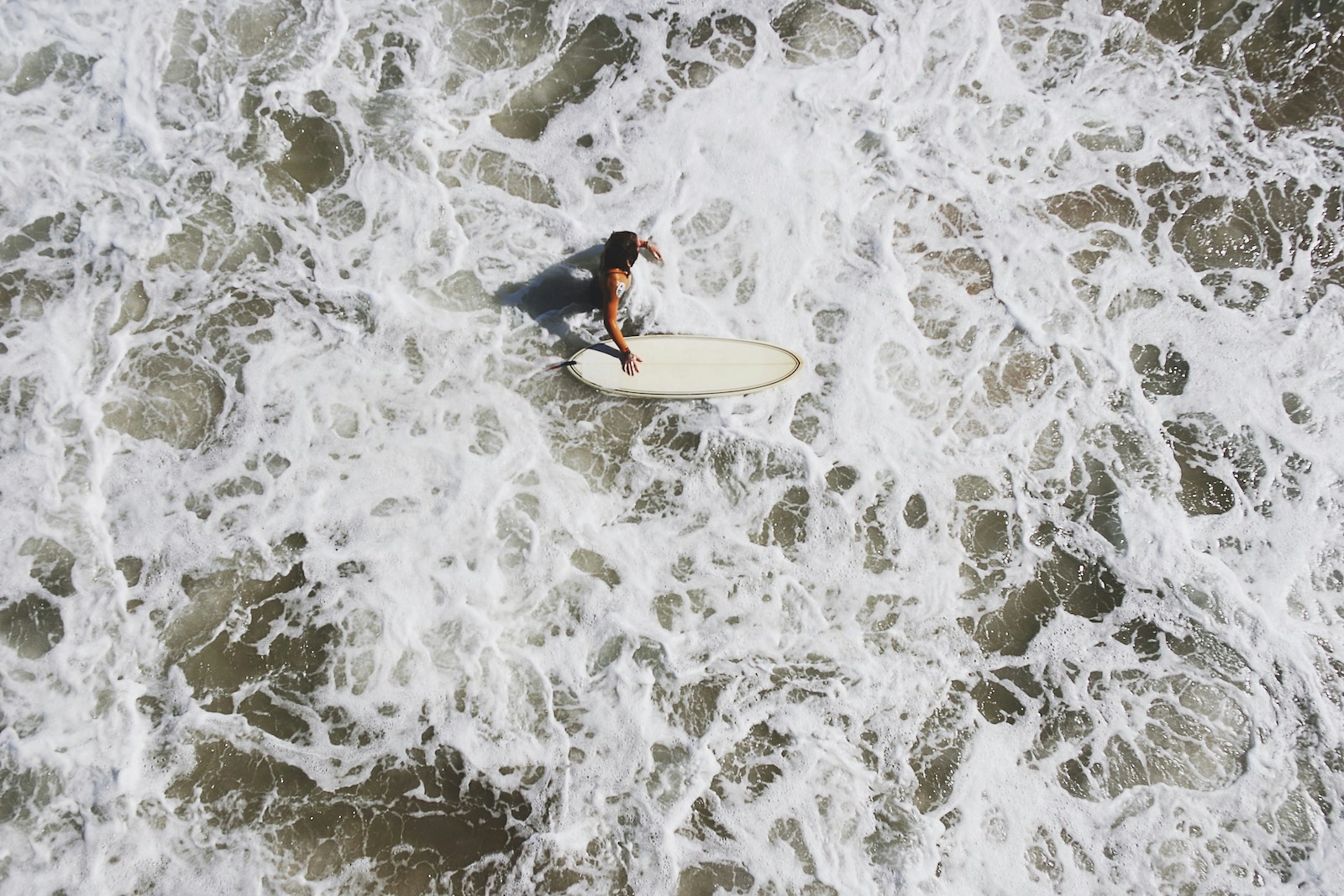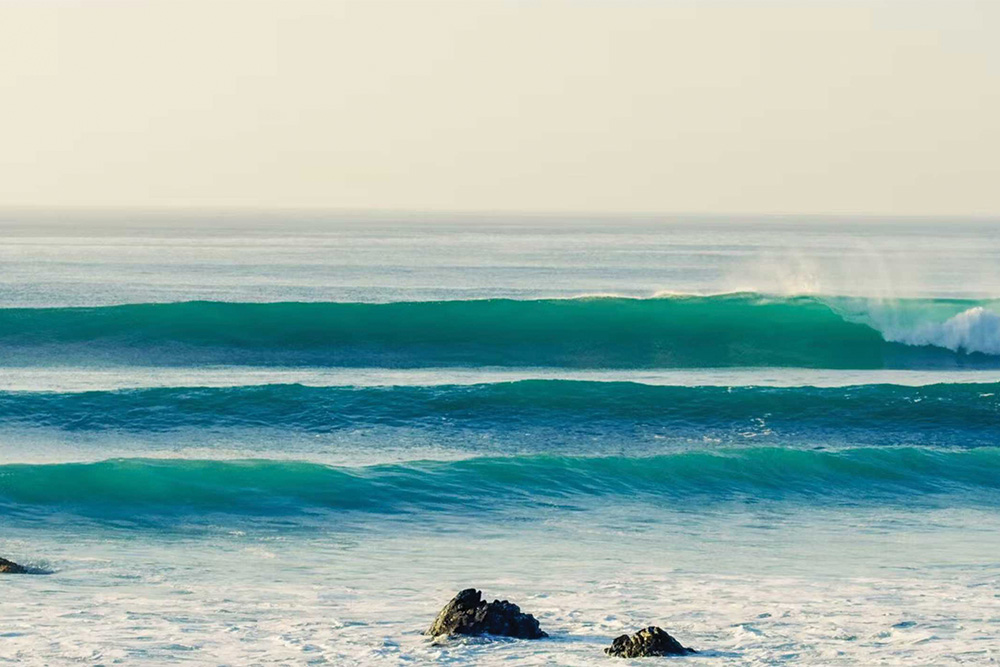For many surfers, Portugal has been on the map for a long time. Ever since surfing exploded onto the scene in Europe back in the 1920s, Portugal has been one of the main places to surf and travel due to its long coastline exposed to swell after swell.
In this article we’ll take a look at some of the best surf spots in Portugal, the surf seasons, and where you will find some giant waves not for the faint-hearted.
Let’s rip in!
Surfing Portugal’s Waves: An Insider’s Guide to Surfing in Portugal
Portugal’s Atlantic coastline boasts some of Europe’s best surf. Period.
With quality waves, well-priced surf camps, and charming beach towns, Portugal has become a premier surf destination that rivals even Morocco to the South and France or Spain to the North.
The West Coast of Portugal
Portugal’s surf scene centers around the west and the very southwestern regions. Some of the best spots and most popular areas for consistent surf include:
Peniche
This town is pretty much the most Western point on the mainland of Europe and is a really popular base for a surf trip. With powerful beach breaks and a few rocky points, the area is well-suited to intermediate and advanced surfers.
Prime spots are Baleal and one of the best waves in the World – Supertubos.

Ericeira
Just north of Lisbon (around 45 minute’s drive) Ericeira offers great variety with mellow sand and rock-bottomed points, hollow beachies, and rocky reefs.
The break of Ribeira D’Ilhas is the jewel in the crown, with truly epic surf on its day. And if you hunt around there are a load of top-rated surf spots all within a short drive or bike ride of each other too.
Arguably the epicenter of surfing in Portugal, with some of the World’s best surfers like Kanoa Igarashi and Frederico Morais now calling it home.
Another really popular surf town, the region around Ericeira is now part of a World Surfing Reserve – which means development in and around the water’s edge must be limited to preserve the natural environment.
Cascais
Tucked between the capital city of Lisbon and Estoril on the Portuguese Riviera lies the classy beach town of Cascais. The main beachbreak of Carcavelos can produce thumping tubes in Winter, and gentle beginner waves in Summer.
The main indicator spot of Guincho is almost never flat, so even in Summer there will be waves to ride.
Being so close to Lisbon, these beaches have a really nice vibe year round.
Take a bike ride along the cycle path that meanders next to the coast if the waves are flat – and don’t forget to stop for an imperial (small beer) and a small bowl of tremoços which are the perfect accompaniment.
For a surf and yoga trip to Cascais check out the Moby Dick Surf House.
Costa Da Caparica
Across the south side of the river from Lisbon, you’ll find a mix of beach breaks that work for all levels when conditions are right.
With a beachfront akin to Southern California, the cycle path along the beach and bars that open into the early hours, the scene at Costa Da Caparica is not to be missed.
Check out this surf camp for your next unforgettable surf trip.
Lagos and around
The beaches around Lagos pick up huge westerly swells that wrap onto the South coast of Portugal.
Now a haven for digital nomads, Lagos is a vibrant party town in Summer, but the best surf is normally found in Winter. A great place to base yourself, if the waves are small on the south, exposed beaches of the West Coast are just 20 minutes away.
Sagres
One of the best surf towns in Portugal, at the southwestern tip, Sagres is a great place to improve your surfing skills.
I’d say one of the best spots in Portugal for beginners, the beaches of Mareta, Beliche and Tonel, give you a load of variety within a 5 minute drive.
For a perfect Sagres getaway, have a look at the Algarve Surf Camp
Why Portugal is Ideal for Surfers
What makes Portugal such an appealing place to catch waves?
For starters, there are a tonne of surf beaches up and down the entire coast. If you are looking for a full-on surf trip or just looking to improve your surfing, there are plenty of setups to help you out.
Portugal has a wide variety of breaks too – mellow sandy beach breaks, heaving slabs, and long pointbreaks (if you know where to look).
What Surfboards to Bring
If you want to ride big waves and are pretty experienced, you’ll need a regular shortboard and perhaps a step-up. If you’re visiting in Summer, pack a small wave board or your groveller.
As for beginners learning the ropes, surfboard rentals are everywhere – soft-top boards at around 8-9 feet are readily available so you don’t need to bring one with you.
If you’re at the intermediate level you will probably want to bring your own board for familiarity, but if you are heading to one of the surf hotspots, rest assured you can easily rent a mid length or a fish pretty easily.
Do I Need a Wetsuit?
In the warmer summer months of July & August, the water can still be a bit chilly. Pack full 3/2 or short sleeve spring if you have one.
From June to September, most surfers opt for a 3/2mm or even a 4/3mm wetsuit for warmth while spending hours in the water.
Water temperatures dip to around the high 50’s in the Winter, making 5/3 the go for most surfers. If you are surfing in Lisbon or further North, pack a pair of booties to keep your tootsies warm.
Tips for Planning Your Surf Adventure
- Research optimal seasonal windows for beginner waves vs. experienced waves at your target breaks
- Renting a car allows flexibility to chase swells up and down the coast
- Pack layers of wetsuit options depending on the season you visit
- Be ready to check tide charts & surf reports daily to capitalize on good conditions
- Expect crowds if visiting during European school holidays in August
- Learn basic Portuguese phrases to be polite with locals in the lineup
- Keep valuables protected – places known for good surf also attract opportunistic thieves
When to Go
Portugal is truly a year round surf destination – the seasons do make a difference, but you can pretty much surf every day of the year.
Personally, I think the best time for surfing in Portugal is September/October or February/March. The weather can be great, and there will be plenty of surf on tap.
Winter months see bigger swells and some rainy weather, so if you are not too bothered about sunshine, Winter might be best for you.
If you’re learning, the smaller waves of Summer are beginner-friendly and might be the way to go, but to be honest, due to the amazing diversity, you can always find a wave somewhere.
Local Surf Etiquette
As with any surf trip, try to be polite in the lineup, take turns and avoid snaking other surfers.
At crowded heavy spots like Supertubos for instance, pick and choose your waves carefully to avoid getting into scrapes with the locals.
Be friendly and don’t be afraid to strike up a conversation – generally the level of English in Portugal is very high, especially amongst the surf community. Learn a few phrases and you’ll be fine!
Getting Around
Lisbon, Porto and Faro airports service international flights into Portugal.
Renting a car is cheap and a great idea as it allows a bit of swell chasing up and down the coast.
If you book one of our packages, we can take you straight to the waves so a car is not really required.
Nightlife & Apres Surf Activities
The buzzing harbor front of downtown Ericeira lets surfers bar-hop to refuel over grilled seafood, platters of oysters, and Portuguese wine every evening.
In Peniche, the Fortaleza and Liquid clubs host big name DJ sets for dancers needing to burn off some steam after hours battling the waves.
And for the ultimate night out, check out downtown Lisbon and perhaps Lux Frágil with two dance floors and mix of international and local DJs,
Surfing in Nazaré
The huge waves of Nazaré have earned global fame mainly for its massive tow-in surfing waves that reach up to around 100 feet tall off Praia do Norte during Winter.
Towards Nazaré’s southern end, surf spots like Farol round the rocky peninsula as well as Playa de Alemana offer waves that are not so death defying – breaking over sand mixed with small rock shelves. They cater to average surfers not quite ready for tow-ins!
The best time for mere mortals to watch the waves around Nazaré is late fall into the Winter – this is when consistently large swells arrive, smashing into the cliffs at Praia do Norte.
Through Summer the surf dies down with crowds filling the beaches – so if you want to tell your buddies you have surfed Nazare, visit in the Summer!
Surfing in Portugal Q and A
Can beginners surf in Portugal?
Yes, Portugal has many good options for beginner surfers.
The warmer waters in the Algarve during shoulder season (May/June/September) around Lagos and Sagres are ideal for lessons.
Further north, the beach breaks around Peniche also cater well to less experienced surfers due to sandy bottoms and smaller Summer swells.
Is it safe to surf in Portugal?
Portugal is generally quite safe for surfing. However, visitors should be aware of rips and larger swells that can pick up during certain times of year on the more advanced breaks. Using caution, checking forecasts, and knowing your limits is always smart no matter your ability level when surfing new spots.
Is Portugal good for beginner surfing?
With its abundance of sandy beach breaks and generally mellower waves during summer around resort towns, Portugal offers one of Europe’s best destinations for beginners looking to learn.
The weather is pleasant too during the peak months of June through September.
How many days do you need in Nazaré?
At least 2 or 3 days in Nazaré allows enough time to both watch the spectacle of the huge waves exploding off Praia do Norte, as well as get out to explore the town and maybe surf some of the more sheltered spots in the area.
Where to surf in Portugal in August
August can see the Nortada or North wind blow hard. You’ll have to seek shelter from the wind (which can be easy to do) but temperatures remain high and waves on the mellow side.
What is it like surfing in Portugal in July?
July normally brings smaller, more mellow waves suited for beginners to Portugal. Temperatures around central Portugal are warm too, beach bars are busy and vibes are high! It’s a great time to visit.
Looking for surf camps in Portugal?
With surfable waves on tap year round, there’s no better time to go – check out some of our surf camp options here.




